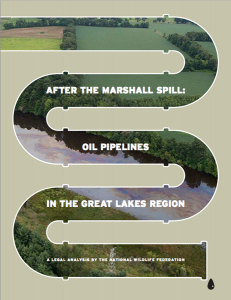We have much more to do and your continued support is needed now more than ever.
Why We Should Pay Attention to Oil Pipelines
 This is a guest post by Sara Gosman, a water resources attorney for National Wildlife Federation.
This is a guest post by Sara Gosman, a water resources attorney for National Wildlife Federation.
On July 25th, 2010, the Great Lakes region experienced one of the largest oil spills in Midwest history—and it was from a pipeline buried underneath the ground.
Almost two years after the spill, the pressing question is whether laws governing oil pipelines protect the Great Lakes Basin and its communities from more spills. In a legal analysis I authored with University of Michigan Law students, “After the Marshall Spill: Oil Pipelines in the Great Lakes Region,” we conclude that federal laws are inadequate, and states have not passed their own laws to fill in the gaps.
The report analyzes federal and state laws in three areas: routing of new pipelines; operation and maintenance of existing pipelines; and spill response planning and reporting.
State vs. Federal Pipeline Safety
 First, we look at where oil pipelines go—the laws on routing of pipelines. We find that there is no federal review of the long-term risks associated with routing, or federal consideration of the cumulative impact of pipelines on entire watersheds such as the Great Lakes Basin. And we find that only three Great Lakes states—Michigan, Minnesota, and Illinois—regulate oil pipeline routes. Of these, only Minnesota and Illinois consider a range of environmental factors.
First, we look at where oil pipelines go—the laws on routing of pipelines. We find that there is no federal review of the long-term risks associated with routing, or federal consideration of the cumulative impact of pipelines on entire watersheds such as the Great Lakes Basin. And we find that only three Great Lakes states—Michigan, Minnesota, and Illinois—regulate oil pipeline routes. Of these, only Minnesota and Illinois consider a range of environmental factors.
Second, we look at what happens when oil pipelines are in the ground—the laws on maintaining and repairing pipelines. We find that the federal risk management program for pipelines (the Integrity Management program) does not cover all environmentally sensitive areas, only those that are considered to be of “high consequence.” Our report webpage has an interesting map that shows recent spills in southeastern Michigan and the location of environmentally sensitive areas. States can only regulate the safety of intrastate oil pipelines—those pipelines that are solely within the state and do not affect interstate commerce. Only Indiana, Minnesota, and New York have programs to regulate intrastate oil pipelines, but these states have adopted the federal standards.
Third, we look at oil pipeline spills—the laws on planning for spills and reporting them if they happen. We find that federal pipeline spill response plans may not address all environmentally sensitive areas because oversight is divided between several federal agencies. Until this year, when Congress directed that spills be reported within an hour, the only specific time limit for reporting was 30 days after discovery of the spill. No Great Lakes states require spill response plans from pipeline operators. We also find that two states—Illinois and Michigan—exempt pipelines from reporting oil spills.
Throughout, we find that public involvement in federal regulation of oil pipelines is limited, as is public access to information. The situation at the state level is no better.
Improving Pipeline Regulations
Based on these findings, our report offers recommendations to improve the regulatory framework governing pipelines. For example, we suggest that:
- The framework should consider the effects of oil pipelines on the Great Lakes Basin as a whole.
- Pipeline safety regulations should protect all areas that are environmentally sensitive to oil pollution, not just high consequence areas.
- Pipeline information should be publicly available, consistent with national security interests.
- States should regulate intrastate pipelines and participate in the oversight and inspection of interstate pipelines.
There is an old adage—out of sight, out of mind. Oil pipelines are out of sight, but that doesn’t mean the risks of these pipelines should be out of mind. The best way to mind these risks is to ensure that federal and state law is fully protective of the environment and the communities that depend on it.
I want to thank the Michigan Law students who worked with me on the report and the Environmental Law and Policy Program (ELPP) at the University of Michigan Law School for its support of the research project. I moderated a panel discussion on oil pipeline safety at the Law School on April 3, 2012, which was sponsored by ELPP, the University of Michigan Environmental Law Society; and the Michigan Energy Law Association.





















